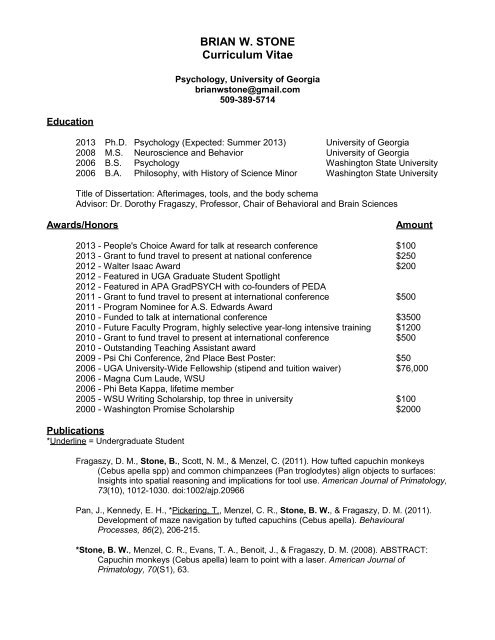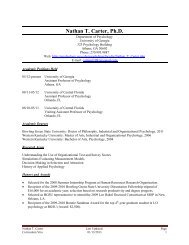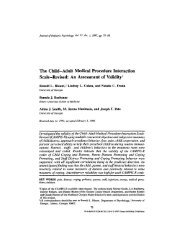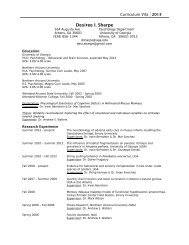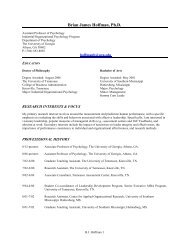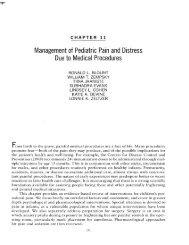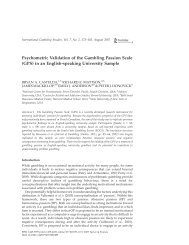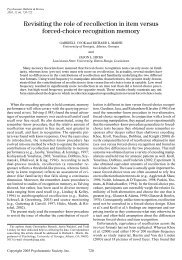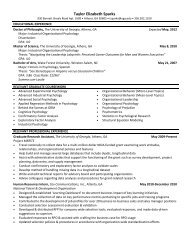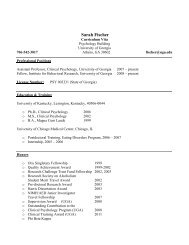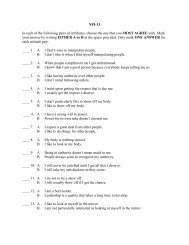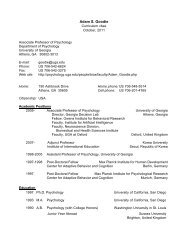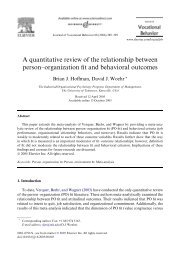BRIAN W. STONE Curriculum Vitae - University of Georgia
BRIAN W. STONE Curriculum Vitae - University of Georgia
BRIAN W. STONE Curriculum Vitae - University of Georgia
Create successful ePaper yourself
Turn your PDF publications into a flip-book with our unique Google optimized e-Paper software.
<strong>BRIAN</strong> W. <strong>STONE</strong><br />
<strong>Curriculum</strong> <strong>Vitae</strong><br />
Psychology, <strong>University</strong> <strong>of</strong> <strong>Georgia</strong><br />
brianwstone@gmail.com<br />
509-389-5714<br />
Education<br />
2013 Ph.D. Psychology (Expected: Summer 2013) <strong>University</strong> <strong>of</strong> <strong>Georgia</strong><br />
2008 M.S. Neuroscience and Behavior <strong>University</strong> <strong>of</strong> <strong>Georgia</strong><br />
2006 B.S. Psychology Washington State <strong>University</strong><br />
2006 B.A. Philosophy, with History <strong>of</strong> Science Minor Washington State <strong>University</strong><br />
Title <strong>of</strong> Dissertation: Afterimages, tools, and the body schema<br />
Advisor: Dr. Dorothy Fragaszy, Pr<strong>of</strong>essor, Chair <strong>of</strong> Behavioral and Brain Sciences<br />
Awards/Honors<br />
Amount<br />
2013 - People's Choice Award for talk at research conference $100<br />
2013 - Grant to fund travel to present at national conference $250<br />
2012 - Walter Isaac Award $200<br />
2012 - Featured in UGA Graduate Student Spotlight<br />
2012 - Featured in APA GradPSYCH with co-founders <strong>of</strong> PEDA<br />
2011 - Grant to fund travel to present at international conference $500<br />
2011 - Program Nominee for A.S. Edwards Award<br />
2010 - Funded to talk at international conference $3500<br />
2010 - Future Faculty Program, highly selective year-long intensive training $1200<br />
2010 - Grant to fund travel to present at international conference $500<br />
2010 - Outstanding Teaching Assistant award<br />
2009 - Psi Chi Conference, 2nd Place Best Poster: $50<br />
2006 - UGA <strong>University</strong>-Wide Fellowship (stipend and tuition waiver) $76,000<br />
2006 - Magna Cum Laude, WSU<br />
2006 - Phi Beta Kappa, lifetime member<br />
2005 - WSU Writing Scholarship, top three in university $100<br />
2000 - Washington Promise Scholarship $2000<br />
Publications<br />
*Underline = Undergraduate Student<br />
Fragaszy, D. M., Stone, B., Scott, N. M., & Menzel, C. (2011). How tufted capuchin monkeys<br />
(Cebus apella spp) and common chimpanzees (Pan troglodytes) align objects to surfaces:<br />
Insights into spatial reasoning and implications for tool use. American Journal <strong>of</strong> Primatology,<br />
73(10), 1012-1030. doi:1002/ajp.20966<br />
Pan, J., Kennedy, E. H., *Pickering, T., Menzel, C. R., Stone, B. W., & Fragaszy, D. M. (2011).<br />
Development <strong>of</strong> maze navigation by tufted capuchins (Cebus apella). Behavioural<br />
Processes, 86(2), 206-215.<br />
*Stone, B. W., Menzel, C. R., Evans, T. A., Benoit, J., & Fragaszy, D. M. (2008). ABSTRACT:<br />
Capuchin monkeys (Cebus apella) learn to point with a laser. American Journal <strong>of</strong><br />
Primatology, 70(S1), 63.
*Menzel, C. R., Menzel, E. W., Kelly, J. W., Chan, B., Evans, T. A., & Stone, B. W. (2008).<br />
ABSTRACT: The rank ordering problem in primate foraging. American Journal <strong>of</strong><br />
Primatology, 70(S1), 64.<br />
Publications In Review/Preparation<br />
*Underline = Undergraduate Student<br />
Stone, B. W., & *Tinker, J. (2013) Disappearing afterimages: Bodily integration <strong>of</strong> external objects<br />
or sensory updating?<br />
Stone, B. W. (2013). The bodily sense <strong>of</strong> ownership: Limbs and tools.<br />
La Cour, L. T., Stone, B. W., Hopkins, W., Menzel, C., & Fragaszy, D. (2013). What limits tool use<br />
in nonhuman primates? Insights from tufted capuchin monkeys (Sapajus spp.) and<br />
chimpanzees (Pan troglodytes) aligning three-dimensional objects to a surface.<br />
Stone, B. W., Liu, F., Sirianni, G., Jeyaraj, T., Busch-Dienstfertig, M., Christel, M., *Vickers, J.,<br />
Visalberghi, E., Fragaszy, D. (2013). Vigilance in capuchin monkeys: Evidence for an<br />
endogenous rhythm.<br />
Stone, B. W., Jeyaraj, T., & Fragaszy, D. M. (2013). How do capuchins stack up against<br />
chimpanzees and humans? Assessing combinatory manipulation in a block stacking task.<br />
Fragaszy, D., Kuroshima, H., & Stone, B. W. (2013). How young children align objects with<br />
surfaces: Effects <strong>of</strong> dimensionality and spatial structure.<br />
Menzel, C. R., Menzel, E. W., Kelly, J. W., Chan, B., Evans, T. A., & Stone, B. W. (2008). The rank<br />
ordering problem in primate foraging.<br />
Presentations<br />
*Underline = Undergraduate Student<br />
Stone, B. W., & *Tinker, J. (2013). Capture <strong>of</strong> positive afterimages by the other senses: Extension<br />
<strong>of</strong> the body schema? Talk presented at 13th Annual Meeting <strong>of</strong> the Vision Sciences Society,<br />
Naples, FL, USA.<br />
Stone, B. W. (2013). Post-human bodies: What sensory psychology tells us about the future <strong>of</strong><br />
integrating biology and technology. Talk presented at 13th Annual UGA Interdisciplinary<br />
Research Conference, Athens, GA, USA. Won People's Choice Award for best talk.<br />
*Tinker, J., & Stone, B. W. (2013). Visual perception <strong>of</strong> objects in the dark: Multi-sensory<br />
interaction drives changes in positive afterimages. Poster presented at 35th Annual Psi Chi<br />
Convention <strong>of</strong> the Behavioral Sciences, Athens, GA, USA.<br />
Stone, B. W., & *Tinker, J. (2013). Disappearing afterimages: Bodily integration <strong>of</strong> external objects<br />
or sensory updating? Poster presented at 59th Annual Meeting <strong>of</strong> the Southeastern<br />
Psychological Association, Atlanta, GA, USA.<br />
LaCour, L., Menzel, C., Hopkins, W., Stone, B., & Fragaszy, D. (2012). Concurrent spatial<br />
relations challenge capuchin monkeys (Sapajus apella) and common chimpanzees (Pan<br />
troglodytes) during object alignment. Poster presented at 35th Annual Conference <strong>of</strong> the<br />
American Society <strong>of</strong> Primatologists, Sacramento, CA, USA.<br />
Amlung, M., Dengler, M., Simpson, E., Stone, B., *Williams, G., & Domizi, D. P. (2012). The role <strong>of</strong><br />
peer mentoring in psychology teaching assistant development. Poster presented at 120th<br />
Convention <strong>of</strong> the American Psychological Association, Orlando, FL, USA.
Stone, B. W., Liu, Q., Jeyarah, T., Sirianni, G., Busch-Dienstfertig, M., Christel, M., Vickers, J.,<br />
Visalberghi, E., & Fragaszy, D. (2011). Vigilance in capuchin monkeys: Evidence for an<br />
endogenous rhythm? Poster presented at the joint meeting <strong>of</strong> the International Ethological<br />
Conference and Animal Behavior Society, Bloomington, IN, USA.<br />
Stone, B. W., Fragaszy, D. M., Scott, N. M., & Menzel, C. (2011). How nonhuman primates align<br />
objects to surfaces: The effects <strong>of</strong> concurrent spatial relations in an object insertion task.<br />
Poster presented at Progress in Motor Control VIII, Cincinnati, OH, USA.<br />
Presentations (continued)<br />
*Underline = Undergraduate Student<br />
Bovier, E. R., Stone, B. W., Fortune, E. E., & Wong, J. C. (2011). Using concept maps as an exam<br />
review strategy to promote active learning. Poster presented at the 23 rd Southeastern<br />
Conference on the Teaching <strong>of</strong> Psychology, Kennesaw, GA, USA.<br />
Amlung, M., Dengler, M., Simpson, E., Stone, B., *Williams, G., Suplita, R., & Domizi, D. P. (2011).<br />
The role <strong>of</strong> peer mentoring in teaching assistant development: A pilot study. Poster presented<br />
at 36 th Pr<strong>of</strong>essional and Organization Development in Higher Education Conference.<br />
*Williams, G., Amlung, M., Dengler, M., Simpson, E., Stone, B., Suplita, R., & Domizi, D. P. (2011).<br />
The role <strong>of</strong> peer mentoring in psychology teaching assistant development: A pilot study.<br />
Poster presented at the 34 th Annual Convention <strong>of</strong> the Behavioral Sciences, Athens, GA,<br />
USA.<br />
Stone, B. W. (2010). Space, tools, and body schema. Talk presented at HOPE Seminar on Tools<br />
in Primates, Myoko-Sasagamine, Japan.<br />
Stone, B. W., Jeyaraj, T., & Fragaszy, D. (2010). How do capuchins stack up against chimpanzees<br />
and humans? Assessing combinatory manipulation in a block stacking task. Talk presented<br />
at the 33 rd International Primatological Society Congress, Kyoto, Japan.<br />
Stone, B. W., Jeyaraj, T., & Fragaszy, D. (2010). How do capuchins stack up against chimpanzees<br />
and humans? Assessing combinatory manipulation in a block stacking task. Talk presented<br />
at the 17 th International Conference on Comparative Cognition, Melbourne, FL, USA.<br />
Stone, B. W. (2009). Combinatory manipulation in capuchin monkeys: Stacking and rotation <strong>of</strong><br />
irregularly-shaped blocks. Poster presented at the 32 nd Annual Convention <strong>of</strong> the Behavioral<br />
Sciences, Athens, GA, USA.<br />
Evans, T. A., Stone, B. W., Menzel, C. R., Fragaszy, D. M. (2008). Monkeys get the point:<br />
Capuchins use lasers to select and rank distant rewards. Talk presented at the 22 nd<br />
International Primatological Society Congress, Edinburgh, Scotland.<br />
Stone, B. W., Menzel, C. R., Evans, T. A., *Benoit, J., & Fragaszy, D. M. (2008). Capuchin<br />
monkeys (Cebus apella) learn to point with a laser. Talk presented at the 31st Annual<br />
Conference <strong>of</strong> the American Society <strong>of</strong> Primatologists, West Palm Beach, FL, USA.<br />
Stone, B. W., *Benoit, J., Fragaszy, D., & Menzel, C. (2007). Testing joint attention in imperative<br />
pointing by captive capuchin monkeys using a novel technological approach. Poster<br />
presented at the 30 th Annual Convention <strong>of</strong> the Behavioral Sciences, Athens, GA, USA.<br />
Research Interests<br />
My research interests focus on how the brain represents the body and organizes action within<br />
peripersonal space. In humans, I am interested in multisensory integration, specifically using<br />
perceptual illusions and cognitive neuroscience methods to investigate the neural bases <strong>of</strong> a
creature’s sense <strong>of</strong>: (1) body/part ownership, (2) agency, (3) embodiment, and (4) selflocation.<br />
In a comparative perspective, I study spatial reasoning, flexible behavior and tool use in a<br />
variety <strong>of</strong> primate species, including capuchin monkeys, chimpanzees and humans. Example<br />
research topics in this area: (1) manual actions inserting objects into substrates (as a<br />
prerequisite for some tool use), (2) combinatory object manipulation (stacking blocks and<br />
oddly-shaped objects), (3) spatial reasoning and decision making (rank ordering and<br />
decisions-from-a-distance in a simulated foraging task), and (4) environment monitoring<br />
behaviors (allocation <strong>of</strong> attention to task, environment and conspecifics).<br />
I am also interested in neurophilosophy, history and philosophy <strong>of</strong> science, artificial<br />
intelligence, learning, and embodied/extended cognition.<br />
Collaborations<br />
Language Research Center in Atlanta, GA (Dr. C. Menzel)<br />
Institute <strong>of</strong> Cognitive Sciences and Technologies in Rome, Italy (Dr. E. Visalberghi)<br />
Kyoto <strong>University</strong> in Kyoto, Japan (Dr. H. Kuroshima)<br />
Max Planck Institute for Evolutionary Anthropology in Leipzig, Germany (G. Sirianni)<br />
Freie Universität in Berlin, Germany (Dr. M. Christel)<br />
N.E. <strong>Georgia</strong> Spine Care and Pain Management in Athens, GA (Dr. J. Holladay, M.D.)<br />
Teaching Experience and Training<br />
Service<br />
Instructor – Graduate Seminar on Teaching, Fall 2012<br />
Instructor – Mind, Body and Action [developed new Special Topics course], Sum 2010<br />
Instructor x3 – Research Methods, Sum 2009, Fall 2009, Spr 2010<br />
TA x3 – Physiological Psychology, Fall 2010, Spr 2011, Sum 2012<br />
TA x6 – Research Methods, Fall 2008, Spr 2009, Fall/Spring 2011, Spring 2012, Spring 2013<br />
TA x2 – Cognition, Sum 2012; also WSU, Fall 2005<br />
Co-TA – Sensation and Perception, Fall 2010<br />
Guest Lectures – Graduate Seminar in Teaching, 2011<br />
Guest Lectures – Sensation and Perception course, 2010-2011<br />
Guest Lectures – Physio. and Comparative Psych course, GA Gwinnett, 2010<br />
Guest Lectures – TIPS Summer Brain Program for Gifted High Schoolers, 2009-2010<br />
Undergraduate RA Mentor – Primate Cognition and Behavior Lab, 2006-2013<br />
Interdisciplinary Certificate in <strong>University</strong> Teaching, 2013 (expected)<br />
Teacher Training Courses<br />
• Practicum in Teaching Psych, 2010<br />
• Student Learning, 2009<br />
• Graduate Teaching Seminar, 2006<br />
<strong>University</strong> Teaching Portfolio Program, 2011<br />
Teaching Conferences Attended:<br />
• UGA Teaching Academy Faculty Symposium, Helen, GA, 2011<br />
• Southeastern Conference on the Teaching <strong>of</strong> Psychology, Kennesaw, GA, 2011<br />
• Society for Teaching <strong>of</strong> Psych. e-Conference on Teaching Biopsychology, 2010<br />
• Society for Teaching <strong>of</strong> Psych. e-Conference on History <strong>of</strong> Psychology, 2011<br />
• Society for Teaching <strong>of</strong> Psych. e-Conference on Mentoring U-grad Research, 2013<br />
Co-founded teaching organization featured in APA's gradPSYCH magazine November 2012
Consulted on phantom limb pain for N.E. <strong>Georgia</strong> Spine Care and Pain Management, 2012<br />
Co-founder, Executive – Psychology Educators Development Association, UGA, 2010-2011<br />
Co-founder, Neuroscience Representative – Graduate Student Committee, UGA, 2010-2011<br />
Co-president – Neuroscience Student Association, UGA, 2010-2011<br />
Peer-review Reader – <strong>Georgia</strong> Junior Science and Humanities Symposium, 2013<br />
Served on multiple panels for Undergraduate Neuroscience Organization, UGA, 2009-2012<br />
Co-coordinator for Training Undergrad RAs – Primate Cognition and Behavior Lab, 2011-2013<br />
S<strong>of</strong>tware Coordination Team – Primate Cognition and Behavior Lab, 2006-2008<br />
Designed and led departmental teaching round-table on teaching Research Design, 2010<br />
Helped put on school-wide Teaching Assistant Orientation; co-led a session for ~200, 2010<br />
Co-led a session for school-wide Teaching Assistant Orientation, 2011<br />
Mentored dozens <strong>of</strong> undergrads in research, on career / grad school; placed many in labs<br />
Peer mentor for new GTA instructors <strong>of</strong> Research Methods<br />
Organized new program’s meet-and-greet for psych. dept.; organized grad. Olympics, 2010<br />
Training / Affiliations<br />
Grant Training: grant writing seminar, individually authored/submitted federal grant proposal<br />
Grant Training: Sigma Xi grant writing workshop, NSF grant writing workshop<br />
Ethics Training: CITI IRB, Animal Care and Use Compliance, AALAS Primate Training<br />
Imaging Training: Course on fMRI, involving data collection and analysis<br />
Statistics Training: 5+ courses, including multiple regression, experimental design, ANOVA<br />
Data Presentation Training: E. Tufte all-day seminar on quantitative display <strong>of</strong> information<br />
S<strong>of</strong>tware Experience: SPSS, Excel, PowerPoint, Observer, Mendeley, Premiere, V. Studio<br />
Programming Experience: courses in Python, C, C++, VB.NET, HTML<br />
Learning Management Systems Training: workshops/experience in ELC, WebCT<br />
GRE 2005: Total 1490/1600, Verbal 700/800, Quantitative 790/800, Analytical Writing 6.0/6.0<br />
Member, Associate - Sigma Xi<br />
Member, Predoctoral - Vision Sciences Society<br />
Affiliate, Student - International Primatological Society<br />
Affiliate, Student - American Society <strong>of</strong> Primatologists<br />
Affiliate, Student - Southeastern Psychology Association<br />
Affiliate, Student - Society for the Teaching <strong>of</strong> Psychology<br />
References<br />
Dorothy Fragaszy, Ph.D.<br />
Pr<strong>of</strong>essor, Psychology<br />
<strong>University</strong> <strong>of</strong> <strong>Georgia</strong><br />
doree@uga.edu<br />
Kacy Welsh, Ph.D.<br />
TA Supervisor, Psychology<br />
<strong>University</strong> <strong>of</strong> <strong>Georgia</strong><br />
kwelsh@uga.edu<br />
Paul Quick, Ph.D.<br />
Faculty Development Coordinator<br />
<strong>University</strong> <strong>of</strong> <strong>Georgia</strong><br />
pauquick@uga.edu<br />
B. Randy Hammond, Ph.D.<br />
Pr<strong>of</strong>essor, Psychology<br />
<strong>University</strong> <strong>of</strong> <strong>Georgia</strong><br />
bhammond@uga.edu<br />
Charles Menzel, Ph.D.<br />
Researcher, Language Research Ctr.<br />
<strong>Georgia</strong> State <strong>University</strong><br />
lrccrm@langate.gsu.edu<br />
Lisa Renzi, Ph.D.<br />
Part-Time Clinical Assistant Pr<strong>of</strong>essor<br />
<strong>University</strong> <strong>of</strong> <strong>Georgia</strong><br />
lrenzi@uga.edu


